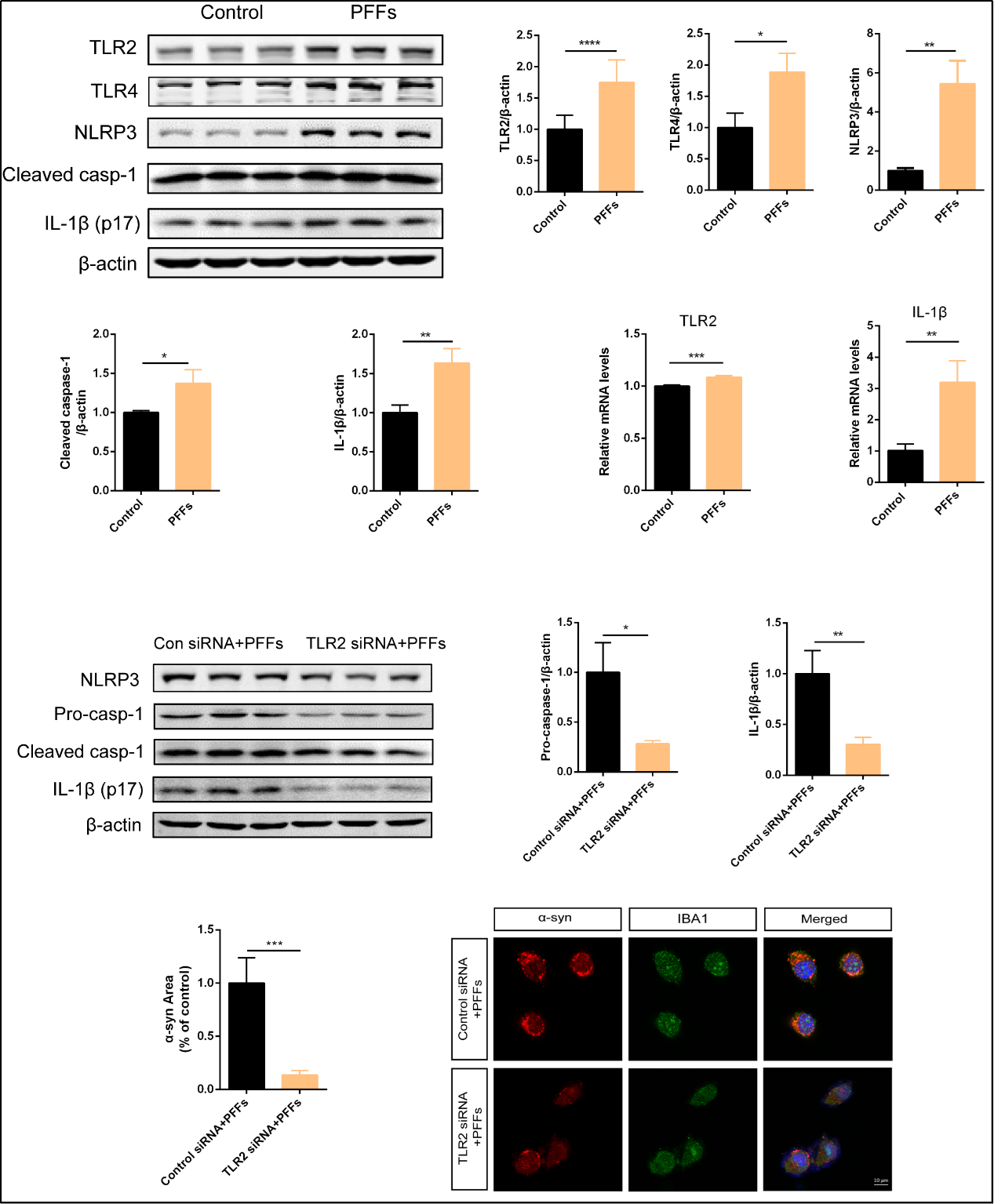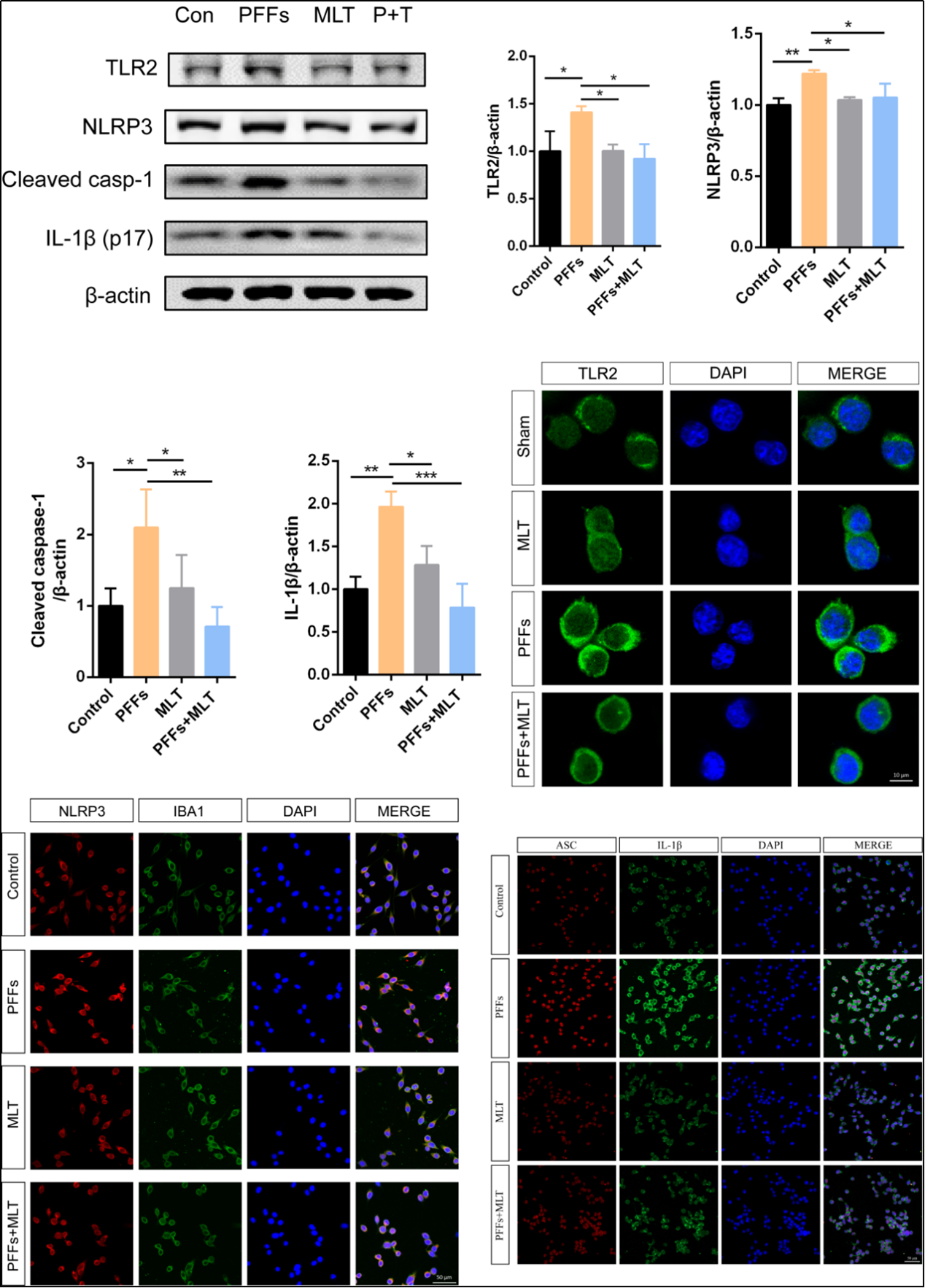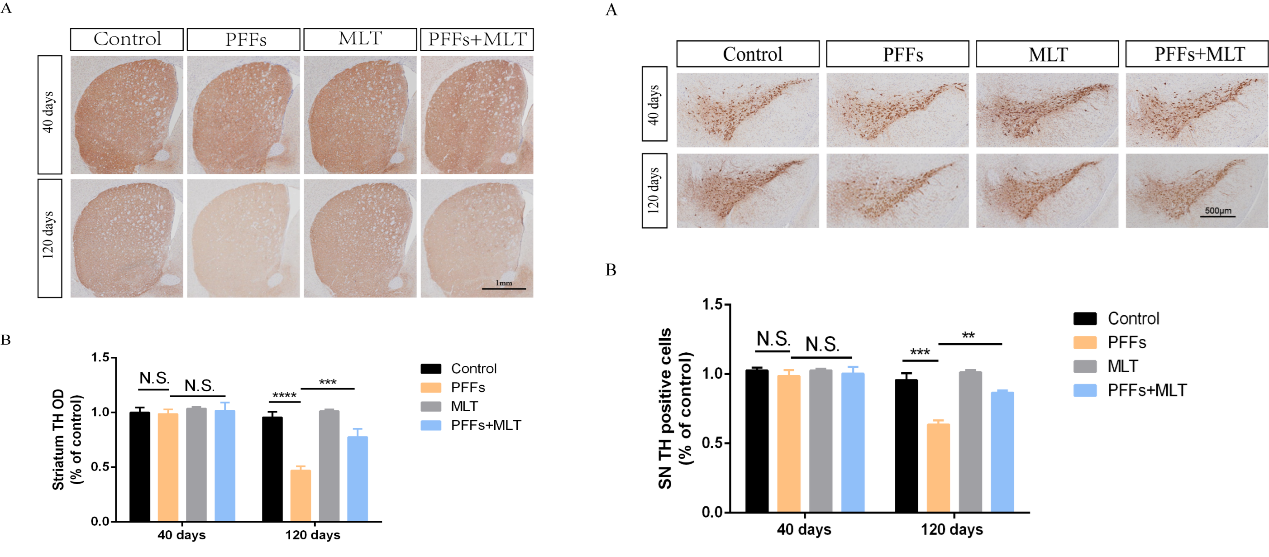Objective: This study aims to investigate the impact of MLT on inflammation signaling pathway mediated by TLR2 in α-synuclein (α-syn) overexpressed BV2 cells and PD animal models, shedding light on the protective mechanism of MLT in PD.
Background: Neuroinflammation, linked to microglia activation, has garnered significant attention in the context of Parkinson’s disease (PD) development. Previous research suggests that melatonin (MLT), a neuroprotective agent, exhibits anti-inflammatory effect in PD, yet the precise mechanism remains unclear.
Method: Preformed α-syn fibrils (PFFs), generated through ultrasound, were utilized to induce α-syn overexpression in BV2 cells and PD mouse models. The anti-inflammatory effect and molecular mechanism of MLT were investigated in vivo and in vitro, with four groups: control, PFFs intervention, MLT alone and MLT treatment. Western blot and immunofluorescence staining assessed the expression of TLR2 and NLRP3 inflamomosome pathway in PD models. Motor function in mice was evaluated using by pole test and rotarod test, while microglial proliferation and dopaminergic neuronal degeneration were assessed via immunohistochemistry.
Results: MLT down-regulated TLR2 expression and reduced the levels of NLRP3, ASC, caspase-1, and IL-1β in BV2 cells and midbrain tissue of PFF-treated mice. Behavioral assessments demonstrated that MLT treatment significantly alleviated motor dysfunction and delayed the progression of PD on the 120th day. Moreover, MLT treatment inhibited PFF-induced microglial proliferation in the striatum and substantia nigra of mice, resulting in reduced dopaminergic neuronal death and a protective effect on PD.
Conclusion: In BV2 cells and PFF-induced mouse models, MLT attenuates the activation of the NLRP3 inflammasome in microglia by modulating TLR2 expression, thereby mitigating neuroinflammation and protecting dopaminergic neurons. These findings contribute novel insights into the anti-inflammatory therapeutic mechanism of MLT in PD.(Submitted to IAPRD meeting on January 28th)
α-syn modulates NLRP3 Activation via TLR2
MLT inhibits NLRP3 Inflammasome Activation
MLT protects against DA neurons degeneration in PD
References: Conway K A, Harper J D, Lansbury P J. Fibrils formed in vitro from alpha-synuclein and two mutant forms linked to parkinson’s disease are typical amyloid[J]. Biochemistry, 2000, 39(10): 2552-2563.
Cremades N, Chen S W, Dobson C M. Structural characteristics of alpha-synuclein oligomers[J]. Int Rev Cell Mol Biol, 2017, 329: 79-143.
Cui Y, Yang M, Wang Y, et al. Melatonin prevents diabetes-associated cognitive dysfunction from microglia-mediated neuroinflammation by activating autophagy via tlr4/akt/mtor pathway[J]. FASEB J, 2021, 35(4): e21485.
Kim C, Rockenstein E, Spencer B, et al. Antagonizing neuronal toll-like receptor 2 prevents synucleinopathy by activating autophagy[J]. Cell Rep, 2015, 13(4): 771-782.
Mayo J C, Sainz R M, Tan D X, et al. Melatonin and parkinson’s disease[J]. Endocrine, 2005, 27(2): 169-178.
Marras C, Beck J C, Bower J H, et al. Prevalence of parkinson’s disease across north america[J]. NPJ Parkinsons Dis, 2018, 4: 21.
To cite this abstract in AMA style:
XY. Wang, JW. Li, HS. Liu, XN. Xiong. Melatonin Modulates NLRP3 Inflammasome Activation through TLR2 to Protect Against Parkinson’s Disease [abstract]. Mov Disord. 2024; 39 (suppl 1). https://www.mdsabstracts.org/abstract/melatonin-modulates-nlrp3-inflammasome-activation-through-tlr2-to-protect-against-parkinsons-disease/. Accessed February 11, 2026.« Back to 2024 International Congress
MDS Abstracts - https://www.mdsabstracts.org/abstract/melatonin-modulates-nlrp3-inflammasome-activation-through-tlr2-to-protect-against-parkinsons-disease/



